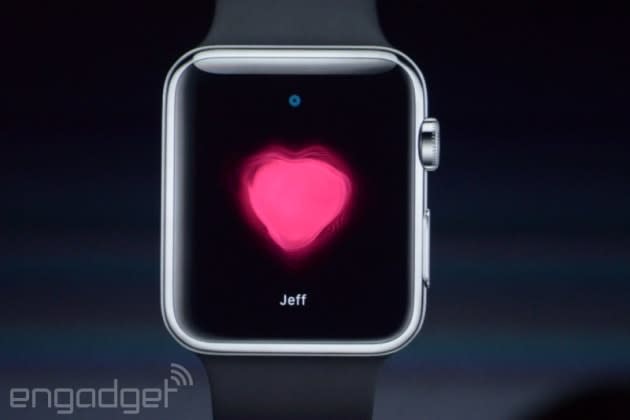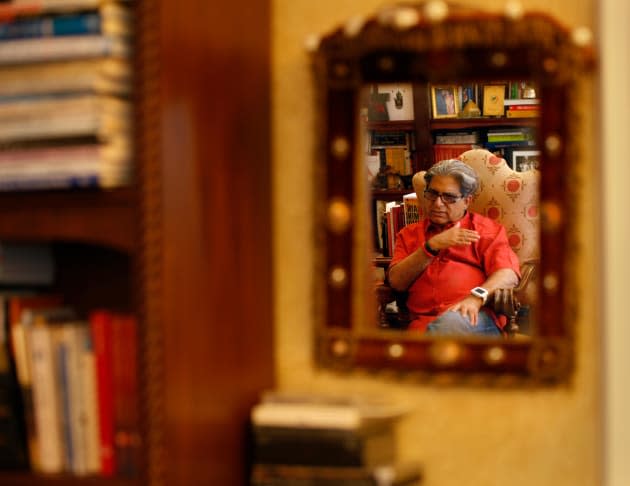Deepak Chopra: the spiritualist as technologist

Deepak Chopra has an app. And that's about the least of the famed spiritual guru/physician/alternative-medicine advocate/friend of Oprah's technological ambitions.
Chopra, who's written over 80 books to date and runs the Chopra Center for Wellbeing in Carlsbad, California, also has a wearable in the works, and is building a wellness site he hopes will become "the largest social network in the world." It is all, by Chopra's own admission, a rather naked play for reaching a younger demographic. He's done with the baby boomers, or as he cheekily explains: "It's my focus these days because my generation, people are so fixed in their habits that, you know as they say, we're changing things one funeral at a time. I gave up on my generation."
Unsurprisingly, Chopra's first foray into the mobile-app space, The Non Local, combines the meditative poetry of 13th century mystic Rumi with relaxing music to foster a transcendent state of well-being in the listener. The app's even named after a controversial concept of quantum physics, a favorite of Chopra's. Nonlocality, in simple terms, refers to the ability of two particles to communicate outside of space and time; it's what Einstein called "spooky action at a distance."
"Think of LinkedIn," Chopra says of his social network, "but with one goal: Help people achieve optimum physical, emotional and spiritual well-being."
It's also why Chopra chose to partner with audio-solutions company DTS to bring its Headphone:X surround sound to the 12 tracks of poetry (voiced by Chopra) and soothing music contained within The Non Local. The idea behind this, he says, is that the immersive audio of Headphone:X "very accurately recreates the original sound environment." And thus it should mirror the meditative feeling of existing beyond the perceived constraints of space and time.
It's part of a larger research initiative into the effects of sound on the human brain that's underway at the Chopra Center in conjunction with various scientists at the University of California, San Diego; University of California, San Francisco; Harvard University; Mount Sinai Hospital; Duke University; and the Scripps Translational Science Institute.
"We look at brainwaves, but now we are correlating that with other things that we are doing as I said at the center: gene expression," he says. "We are looking at the microbiome. We have a program going on right now called Self-directed biological transformation initiative (SBTI). We are looking at a combination of technologies, including vibrational medicine, music and mantras, and binaural beats in combination with massage and other techniques."

Deepak Chopra's app, 'The Non Local,' offers a mix of soothing music and mystic poetry.
Though the iOS app (an Android version is coming soon) is free and comes bundled with two tracks, it does support in-app purchases for any additional meditations, all priced at $1.99. Chopra says he could release up to 50 new tracks (some free) this year, each set to his own healing meditations and backed by binaural beats or ultrasound, with plans to amass "a big library." It might seem like a blatant cash grab. After all, it's quite a common business practice for a boldface name like Chopra to profit from endorsements. Just look at Kim Kardashian's incredibly popular mobile game and its addictive mini-transactions. But unlike that transparent ploy for consumers' dollars, Chopra's The Non Local has a simple goal: "to explore music and sound therapy as a modality of healing."
Besides, Chopra's not too concerned about the awkward mix of commercialism with spirituality. As he sees it, it's a necessary means to an end. "I think this is the best way to reach a lot of people," he says of The Non Local's in-app purchases. He adds, "Why should one feel conflicted at all in helping people who want to be helped? After all, we have a center to run. We have 110 employees. We do research. If you go to our Chopra website ... you'll see that we have sent 1.5 million children to school every day and give them a meal in India. We are doing research with seven institutions that needs a lot of funding. ... So I'm very proud that we are making a lot of money and not selling guns or selling alcohol or drugs."
It's Chopra interest in the field of wearables, however, that is perhaps the most fascinating. "I'm a very big fan of consumer technology," he tells me. "Even now, I'm wearing about five devices as I speak to you, measuring everything in my body from heart rate variability to brain waves, to sleep patterns, to dream states to galvanic skin response." Those devices range from a Spire to track breathing; a Fitbit and Jawbone Up24 to track fitness and sleep; and a Basis Peak (of which Chopra is an investor) to measure heart rate.

Apple demonstrates the heartbeat-sensing feature of its Watch.
In particular, research into tracking heart rate variability seems top of mind for Chopra. He mentions that the next version of Basis will include a feature that converts a user's heartbeats into music, hinting that The Non Local could also offer similar functionality at some future point. Chopra's also working with a developer on a heart rate tracker called Bliss that, he claims, tracks "when people go into a deep transcendent moment or even a deep relaxation moment ... And then the device vibrates just a little bit so you pick it up and then your brain learns to reproduce that so you can be in a state of flow all the time."
For this same reason, Chopra's also eagerly anticipating the release of the Apple Watch, which was announced with what some considered a gimmicky feature: the ability to send your heartbeat to other Watch owners.
"[It's] because Apple is up to speed with what's going on," he says of the company's decision to include a heartbeat function in the Apple Watch. "We have actually at our center these small devices that are the size of a Band-Aid and they can pick up your heart information and your brain information. ... And the iPhone will pick it up if it's within 10 feet or less. And, if you want, then it'll transmit that information to a cardiologist at Scripps or to a researcher that we work with at UCSD and instantly have it analyzed in a supercomputer [.] So this kind of research is already happening."

A screenshot of Deepak Chopra's chakra-focused 2011 Xbox 360 Kinect game 'Leela.'
Given this intense focus on or, some could argue, enthusiasm for wearables, it's no surprise that Chopra's planning to release a wearable tracker of his own. The device, which is currently under development with a manufacturer based out of India, is Chopra's attempt at creating a "super device."
"We want to aggregate all of these smart wearables into maybe one device that looks at everything," he says.
That unnamed device is only part of Chopra's plan for advancing spirituality through modern-day technology. Jiyo, a Sanskrit word for "live," is the name of Chopra's forthcoming social network. It will, understandably, tie into his wearable push, amassing that health data, as well as research from his center to promote holistic wellness. "Think of LinkedIn," he says, "but with one goal: help people achieve optimum physical, emotional and spiritual well-being." The site will be free to join, though Chopra admits it will also include premium tiers for those that want to join specific programs -- say, for example, a group focused on curing diabetes or even a weight loss club.
The future Chopra envisions doesn't segregate spiritual growth and personal well-being from scientific advancement.
"There are five drivers of change that I'm going to be focusing on," Chopra explains. "One of them is technology. The second is social networks combined with that technology. The third is consumables. The fourth is metrics, to be able to measure with our research. And the fifth is offering personal growth. ... So when I combine all of this, these five drivers of change that I just mentioned I think that we can facilitate people's personal growth and actually give them a very enjoyable way of learning."
The future Chopra envisions doesn't segregate spiritual growth and personal well-being from scientific advancement. Rather, he believes they can be one and the same. Though he does acknowledge that the "diabolical possibilities" our connected world offers will exist in tandem with the more positive aspects of future tech.

Deepak Chopra speaking at his home in California.
"I'm sure in the near future, I can send you a fragrance or a taste by basically causing your device to release that fragrance depending on the combination of signals I sent. I think this is soon going to be a multi-sensory experience that we can use to create a global brain for my vision anyways: a more peaceful, just, sustainable, healthy, happy, prosperous world. It all depends on our collective evolution as a species. Technology should be used by us selectively. We shouldn't allow technology to use us. It's an extension of us. And it's unstoppable, by the way. It's part of the evolution of the human species."
Technology should be used by us selectively. We shouldn't allow technology to use us. It's an extension of us. And it's unstoppable, by the way.
Chopra is no stranger to critics. In fact, his long-standing feud with scientist and noted atheist Richard Dawkins highlights the resistance some in the scientific community have toward Chopra's brand of alleged "pseudoscience." Where Dawkins' mission is to disprove the existence of a godhead, Chopra's is to validate that nonlocal consciousness is central to our collective well-being and the research he funds and conducts.
Chopra's aware that his spiritual teachings and related scientific work arouse skepticism in some. But, he says, the time has come when research from well-known institutions, many of which he's partnered with, will validate his controversial work. "I wrote a book called Quantum Healing 26 years ago and even though it became a national bestseller, it was really vilified by many of the medical establishment. Now I'm redoing the book. I've just refinished it. ... Things take a long time to come to fruition. But I believe that finally science is going to validate a consciousness-based approach to healing."
[Image credits: Jeff Daly/Invision/AP (Chopra at "Oprah's The Life You Want Weekend"); Associated Press (screenshot of Chopra's 'Leela' for Xbox 360); ZUMA Press, Inc / Alamy (Chopra mirror shot)]

